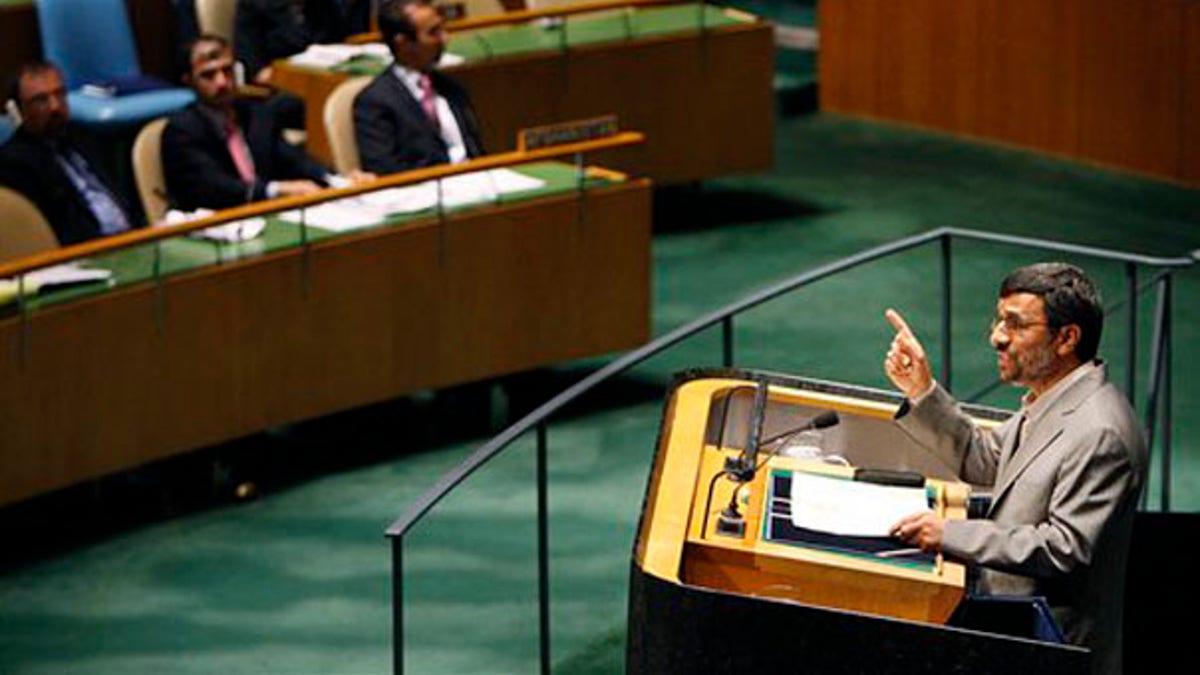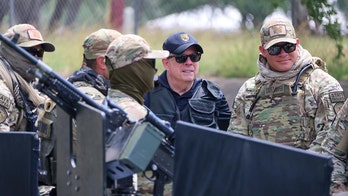
Iranian President Mahmoud Ahmadinejad speaks at United Nations Headquarters May 3. (AP Photo)
Secretary of State Hillary Clinton warned Monday that Iran will face tough sanctions if it does not meet nuclear demands, accusing President Mahmoud Ahmadinejad of trying to "divert attention" after he used a U.N. speech to berate nuclear-armed nations and accuse the United States of committing "acts of terror."
The secretary of state, who spoke a few hours after Ahmadinejad in New York at a U.N. nonproliferation conference for a worldwide spread of nuclear weapons, said Iran was using "the same tired, false and sometimes wild accusations" against the United States and other U.N. members.
"Iran will do whatever it can to divert attention away from its own record," she said, adding that the country "will not succeed in its effort to divert and divide."
Both Clinton and White House Press Secretary Robert Gibbs, at a separate briefing, said Monday that the Obama administration is still open to working with Iran.
Click here for more on this story from our LiveShots blog.
But Ahmadinejad gave no indications that negotiations would resume, as he used the U.N. platform to go on a tirade against the United States and blame the country for the spread of nuclear weapons, prompting representatives from the U.S., Britain and France to walk out.
"The sole purpose of nuclear weapons is to annihilate all human beings," Ahmadinejad said, criticizing nuclear-armed nations while defending his own ambitions. "Its possession is disgusting and shameful."
He outlined a host of demands, calling for nuclear weapons at U.S. military bases to be dismantled, calling for the U.N. Security Council to be overhauled and strongly suggesting that the United States be kicked off the board for the International Atomic Energy Agency.
Ahmadinejad, the only head of state participating at Monday's kickoff for a monthlong review of the Nuclear Nonproliferation Treaty, professed an interest only in pursuing peaceful nuclear energy development, which he said could be put to use in the medical, industrial and agricultural sectors. He said there is no evidence to show his country is seeking to develop a weapon.
But Iran is widely believed to be pursuing a nuclear bomb.
The U.S. delegation will find an ally in U.N. Secretary-General Ban Ki-moon, who said last week that "the onus is on you" -- Ahmadinejad -- to prove the nuclear program is for peaceful purposes, as Iran claims.
While delegates assess the state of the NPT in U.N. conference halls, American and European diplomats will be working elsewhere to reach agreement with the sometimes reluctant China and Russia on a fourth round of U.N. Security Council economic penalties to impose on Iran.
Although Ahmadinejad's presence meant the first-day agenda was dominated by the Iran issue, it was only the beginning of a four-week diplomatic marathon meant to produce a consensus final document pointing toward ways to better achieve the NPT's goals of checking the spread of nuclear weapons, while working toward reducing and eventually eliminating them.
The treaty is regarded as the world's single most important pact on nuclear arms, credited with preventing their proliferation to dozens of nations since it entered into force in 1970. It was a grand global bargain: Nations without nuclear weapons committed not to acquire them; those with them committed to move toward their elimination; and all endorsed everyone's right to develop peaceful nuclear energy.
The 189 treaty members - every nation but India, Pakistan, Israel and North Korea, all of which have nuclear arsenals or weapons programs - gather every five years to discuss new approaches to problems, by agreeing, for example, that the International Atomic Energy Agency, the U.N. nuclear inspection agency, should be strengthened.
But the NPT conference cannot easily "name and shame" an alleged treaty violator, such as Iran, since as a member state its delegation would block consensus.
At three of seven past conferences, delegates failed to produce a declaration, including in 2005, at a time when the U.S. administration, under President George W. Bush, was unenthusiastic about arms control talks.
President Obama has steered the U.S. back onto a negotiating track, including with a new U.S.-Russian agreement to reduce their thousands of long-range nuclear arms. Despite that, Libran N. Cabactulan, the Philippine diplomat who is president of this 2010 NPT conference, said he finds the No. 1 goal of many treaty nations is to press the NPT nuclear powers -- also including Britain, France and China -- to move more rapidly toward disarmament.
To that end, the Nonaligned Movement of 118 developing nations has submitted to the conference a detailed "plan of action" for moving toward global nuclear disarmament by 2030.
One its earliest steps is full ratification and entry into force of the 1996 treaty banning all nuclear tests.
In the first concrete step associated with this 2010 meeting, Indonesia announced last week it would ratify the test-ban treaty. Obama has pledged to push for U.S. ratification of the pact, which was rejected by the Republican majority in the U.S. Senate in 1999.
The Associated Press contributed to this report.




